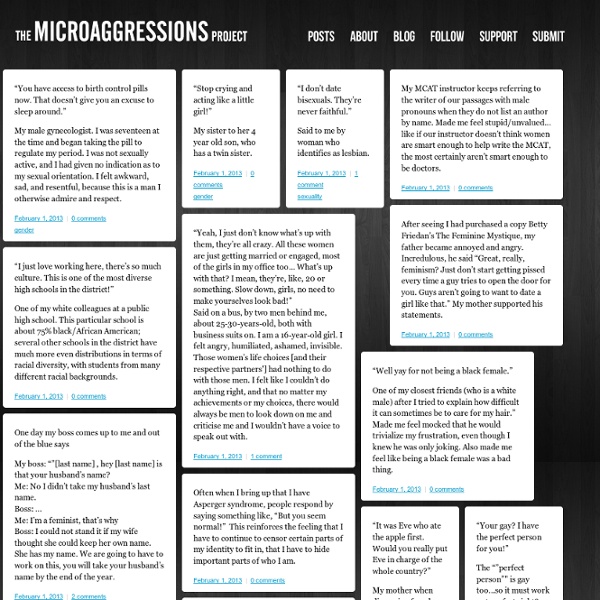



http://www.microaggressions.com/
Interviews: What Protection Of Traditional Knowledge Means To Indigenous Peoples World Intellectual Property Organization member states in July concluded the biennium work of the committee tasked with finding agreement on international legal tools to prevent misappropriation and misuse of genetic resources, traditional knowledge and folklore. Indigenous peoples and local communities are holders of a substantial part of this knowledge and are demanding that it be protected against misappropriation but also against its use without their consent. Intellectual Property Watch conducted two interviews with different indigenous groups attending the 15-24 July WIPO Intergovernmental Committee on Intellectual Property and Genetic Resources, Traditional Knowledge and Folklore (IGC) (IPW, WIPO, 25 July 2013). The IGC is working on the protection of genetic resources (GR), traditional knowledge (TK), and traditional cultural expressions (TCEs or folklore) against misappropriation mainly by commercial interests.
You can have it all Hey peeps- if you ever patronize the High Noon Saloon in Wicker Park/Chicago, I’m going to ask you to stand in solidarity with some friends who were mistreated and boycott them until they make things right. Here is a firsthand account of what went down: "We went here as a group of 4 queer couples, just wanting to grab a drink during Wicker Park Fest. We got a few appetizers and drinks, which were unobjectionable, but definitely nothing special. That’s when things went downhill. One of my friends went to use the bathroom. Terminology So, which terms do I use? Terminology, particularly as it relates to Indigenous peoples, can be tricky to navigate. A term that might be acceptable to some might be offensive to others. Because of this, many people do not feel confident using certain terms when referring to Aboriginal peoples. Fear of using the "wrong" word should never stifle important dialogue and discussions that need to be had. By taking a moment to consider the history of certain terms, it is very possible to learn and be comfortable with which words to use in which contexts.
THISISTHEDREAM headed to prague on thursday. what should i do/see there? i will make with my hands all of the things that are in my heart. I wish I was a photograph tucked into the corners of your wallet I wish I was a photograph you carried like a future in your back pocket I wish I was that face you show to strangers when they ask you where you come from I wish I was that someone that you come from every time you get there and when you get there I wish I was that someone who got phone calls and postcards saying wish you were here The Salzburg Curriculum Bringing diverse communities together is the focus of this aspect of the curriculum. It transcends the concept of global cultures and encompasses age, gender and skill levels as well. Video: R. David Lankes explains how cultural skills relate to the Salzburg Curriculum. Transcript (view as PDF): Here’s the thing: If all you do is sit in a building and maintain a collection, you have built a culture.
The 8 People You Should Never Have Sex With Shutterstock.com 1. Someone else’s significant other. Cultural Competency Welcome to the Cultural Competency Section of our website. New Cultural Competency Curriculum for Oral Health Professionals The Office of Minority Health announces the release of the Cultural Competency Program for Oral Health Professionals (CCPOHP) , an e-learning program designed to better equip oral health professionals with the knowledge and skills to better serve diverse patient populations. Press release | Blog post Please feel free to browse through this section for a comprehensive view of cultural competency. Contact Office of Minority Health (240-453-2882) with any questions.
Diversity Standards: Cultural Competency for Academic Libraries (2012) Purpose and Goals of the Standards The following standards were developed by the Racial and Ethnic Diversity Committee of ACRL (Association of College & Research Libraries), based on the 2001 National Association of Social Workers Standards for Cultural Competence in Social Work Practice.1 The standards are intended to emphasize the need and obligation to serve and advocate for racial and ethnically diverse constituencies. As such, they are intended to apply to all libraries supporting academic programs at institutions of higher education.
It’s Time to Act Often statistics tell a story that spurs us to action. Consider: Only 13% of African-American male 4th graders and 11% of African-American male 8th graders scored at or above proficient on national reading tests; Barely half of all African-American males graduate from high school, and only 5% go to college; Black male teens are eight times more likely to die from homicide than white male teens; African-American males make up only 14% of the US population but nearly 40% of prison inmates; Despite research that links quality school library programs to increased student achievement, many African-American youth live in communities where school libraries are underfunded, collections are out of date, and full-time librarians are scarce.
Protocols for Native American Archival Materials www.firstarchivistcircle.org Protocols for Native American Archival Materials © First Archivist Circle. Culturally inclusive libraries for Māori Your school library can help Māori students become more aware of their culture and heritage. Here you'll find information and strategies to help you plan a culturally inclusive library to support Māori learners. Contents Key educational documents supporting Māori learnersRaising Māori student achievement: research findingsCharacteristics of effective school libraries supporting Māori studentsUnderstanding tikanga Māori values - library staff “Language, Identity and culture count – knowing, respecting and valuing who students are, where they come from and building on what they bring with them.” - Ka Hikitia, p.20
World Libraries: Using the Ghanaian Journal Research Review as an Example for Demonstrating Access to African Research and Scholarship Using the Ghanaian journal Research Review as an example for demonstrating access to African research and scholarship Lorna Peterson Abstract: Reports the results of bibliographic searching, indexing and citation analysis of the Ghanian journal Research Review for defined elements of barriers to access.